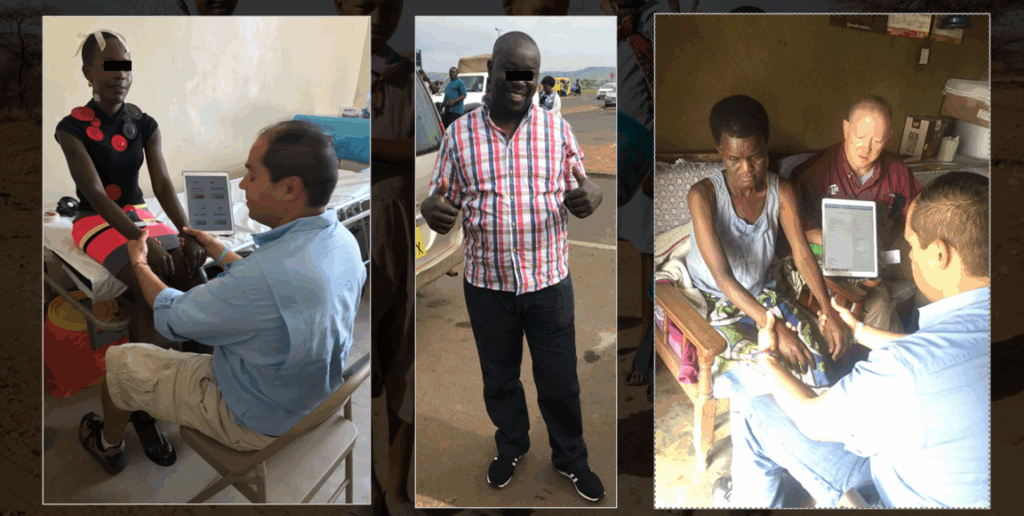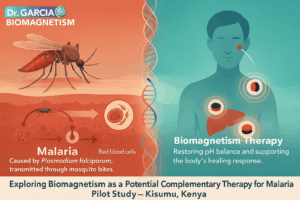Malaria remains a foremost concern in Kenya, with high mortality and morbidity rates despite standard treatment. Malaria is transmitted by Anopheles mosquitoes in humans and is caused by Plasmodium parasites. The present pilot investigation presents the potential of biomagnetism as a therapeutic approach in malaria patients in Kisumu, Kenya.
Sixty voluntary participants from a charitable clinic in Kisumu, Kenya, underwent diagnostic evaluations. Seven participants were confirmed positive Plasmodium falciparum infection. All these participants elected biomagnetism as the sole therapeutic intervention. Six returned for follow-up after three days: Five exhibited parasitological clearance and absolute symptom resolution. And one of them demonstrated initial reduced parasitemia and improved clinical status before achieving clearance following the second biomagnetism session.
These findings align with prior pilot study investigations, including Dr. Brian Frank’s study on typhoid fever, suggesting that biomagnetism may warrant as an adjunctive therapeutic modality in infectious management. The study was coordinated through the Missionary Foundation Global Mission Partners, Inc. as a self funded initiative.
What if magnets could help in the fight against one of the world’s deadliest diseases?
That bold question brought Dr. Luis F. Garcia, MD, and Dr. Bryan L. Frank, MD, to Kisumu, Kenya, where malaria continues to take an enormous toll on families and communities. Their small pilot study, conducted at a charitable clinic, explored whether Biomagnetism—a therapeutic approach using pairs of medium-strength magnets—might offer benefits for patients with malaria.
The Study at a Glance
- Participants tested: 60 people seeking malaria evaluation
- Malaria-positive cases: 7 confirmed with Plasmodium falciparum
- Treatment choice: All 7 elected Biomagnetism instead of conventional drugs
- Results: Within three days, 5 patients showed complete clearance of parasites and resolution of symptoms. The 6th improved initially and cleared after a second session.
In total, every patient who returned for follow-up was free of parasites and symptoms—without pharmacological treatment.
Why This Matters
Malaria remains devastating worldwide. In 2021 alone, there were an estimated 247 million cases and 619,000 deaths, most of them in sub-Saharan Africa and in children under five. Standard treatments save lives, but access, resistance, and cost remain persistent barriers.
The findings from this pilot study are modest in scale but profound in implication. They hint that Biomagnetism could one day play a complementary role in infectious disease management—particularly in underserved communities where cost-effective, non-invasive options are urgently needed.
A Pattern Emerges
This isn’t the first time Biomagnetism has shown intriguing results in infectious disease. In an earlier pilot study on typhoid fever in Kenya, Dr. Frank observed that 10 of 13 patients tested negative for infection within two days of receiving Biomagnetic Pair Therapy.
Taken together, these early glimpses suggest a reproducible effect worth investigating further.

The Science Behind It
How could magnets matter biologically?
Emerging work on static magnetic fields (SMFs) points to several testable pathways that line up with what practitioners of Biomagnetism aim to do—restore healthier local conditions so the body can do its job.
How could magnets matter biologically? Emerging work on static magnetic fields (SMFs) points to several testable pathways that line up with what practitioners of Biomagnetism aim to do—restore healthier local conditions so the body can do its job.
- Redox balance (oxidative stress): A 2024 study showed that applying an SMF during liver cold storage boosted antioxidant enzyme activity and reduced oxidative damage, improving post-storage tissue quality—clear, tissue-level evidence that SMFs can nudge redox biology. ScienceDirect
- Immune signaling: In vitro work with human lymphocytes found SMFs can shift cytokine production (direction depends on field strength/polarity), suggesting an ability to gently “tune” immune responses. PMC
- Microcirculation & flow: A 2025 review synthesizes evidence that SMFs can influence blood flow and microvascular dynamics under certain protocols—mechanisms that could support oxygen/nutrient delivery and clearance during illness. PMC
- Direct pathogen stress (lab models): New microbiology shows SMFs can inhibit bacterial growth via ROS-mediated mechanisms; while malaria is parasitic (not bacterial), this line of evidence supports the broader idea that magnetic exposure can challenge pathogens under specific conditions. PMC
- Ion transport & microenvironment: Broad reviews describe SMF effects on ion channels, membranes, and signaling, providing a biophysical bridge to hypotheses about local microenvironment (including pH) shifts at targeted anatomical sites. MDPI
These signals are early and parameter-sensitive (field strength, polarity, exposure time, and tissue all matter), but together they outline a coherent, testable framework for how Biomagnetism might assist the body’s own defenses—exactly the kind of groundwork that justifies rigorous, controlled trials in infections like malaria.
Limitations and Next Steps
Of course, this was a pilot study:
- Only 7 malaria-positive patients were treated.
- No control group received conventional therapy.
- One participant did not return for follow-up.
That means the results are far from conclusive. But they are provocative enough to warrant rigorous follow-up trials. Large-scale, randomized, controlled studies could help determine whether Biomagnetism truly has a therapeutic role in malaria and other infectious diseases.

Biomagnetic Pairs Applied
The magnetic pairs identified for malaria in this cohort study included:

A Call to Research
The Kenya study was self-funded and conducted through the nonprofit Global Mission Partners, Inc. It represents exactly what early-stage exploration should look like:
safe, ethical, transparent, and designed to spark larger investigations.
For researchers, clinicians, and health innovators, the findings pose a challenge:
Will you help test and validate whether Biomagnetism has a place in global health?
Because if further studies confirm what these Kenyan patients experienced, it could open a new frontier in affordable, accessible care.






